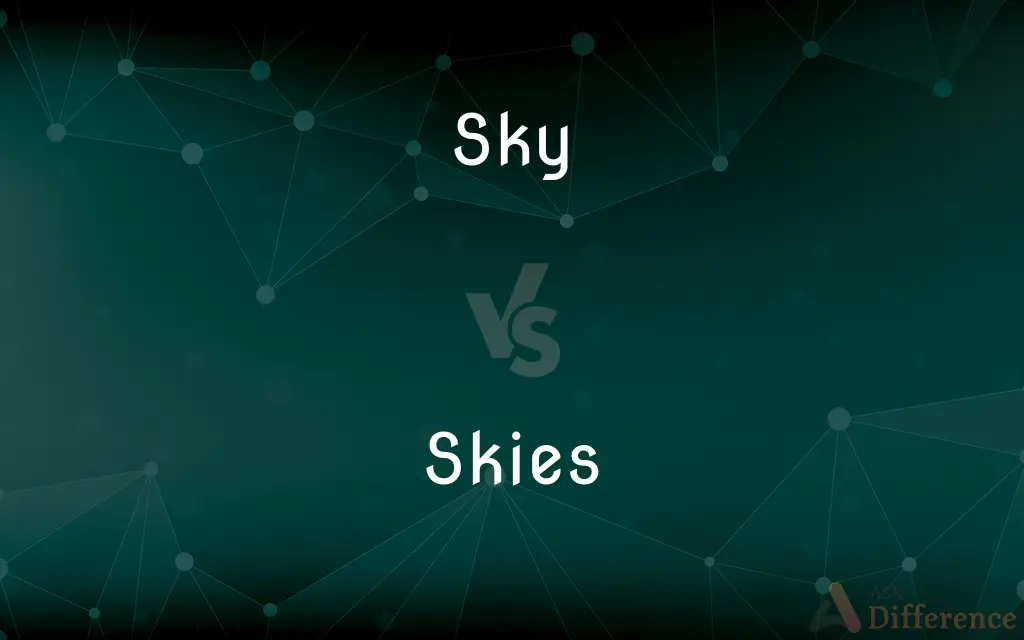Sky vs. Skies — What's the Difference?
By Tayyaba Rehman & Fiza Rafique — Updated on January 30, 2024
"The term 'sky' is the singular form that refers to the expanse of air above the Earth. On the other hand, 'skies' is the plural form, which is often used poetically or when describing various regions or conditions of the atmosphere."

Difference Between Sky and Skies
Table of Contents
ADVERTISEMENT
Key Differences
Sky is used to describe the singular expanse of air visible above the Earth, encompassing everything that can be seen overhead during the day or night. It is a singular noun that refers to one continuous expanse. Skies, on the other hand, is the plural form of sky. It is often used in a poetic or figurative sense, suggesting variety or vastness in the atmosphere, like when describing different weather conditions or multiple geographical areas.
The word sky is commonly used in daily conversation and scientific contexts. It represents the atmosphere as a single entity, for instance, "The sky is clear today." Skies, as a plural form, is employed to describe different types of skies or to emphasize diversity, such as in "The skies of the Arctic and the Sahara are vastly different."
In literary and poetic usage, sky may symbolize limitlessness or freedom, representing a singular concept. Skies, in contrast, are used to evoke a sense of expansiveness and variety, often used in expressions like "the skies above" or "friendly skies."
Sky is used in phrases that refer to specific conditions or phenomena in the atmosphere, such as "night sky" or "morning sky." Skies can be used in broader, more abstract expressions, such as "the skies wept," indicating rain over a vast area or varied weather conditions.
Sky, in its singular form, is also used in scientific and observational contexts, where precision and clarity are needed. Skies, in plural, is more common in artistic, poetic, or metaphorical language, where it evokes a sense of grandeur or multiple perspectives.
ADVERTISEMENT
Comparison Chart
Grammatical Number
Singular
Plural
Typical Usage
Literal, scientific descriptions
Poetic, figurative, or varied descriptions
Representation
A single expanse or specific condition
Multiple expanses or diverse conditions
Context
Everyday conversation, specific observation
Artistic, poetic, broad or abstract concepts
Common Phrases
"Clear sky," "night sky"
"Under the open skies," "clear skies ahead"
Compare with Definitions
Sky
The expanse of air over the Earth.
Birds flew across the blue sky.
Skies
The plural form of sky, indicating expansiveness.
The skies over the mountains are breathtaking.
Sky
The upper atmosphere as seen from Earth.
The sky darkened as the storm approached.
Skies
A symbol of freedom or opportunity.
The skies ahead are full of possibilities.
Sky
The celestial dome above.
Stars twinkled in the night sky.
Skies
A poetic term for the heavens.
The skies were painted with shades of orange and pink at sunset.
Sky
A metaphor for limitlessness or freedom.
She reached for the sky with her dreams.
Skies
Used in phrases indicating weather or conditions.
The skies cleared after the storm.
Sky
The sky is everything that lies above the surface of the Earth, including the atmosphere and outer space. In the field of astronomy, the sky is also called the celestial sphere.
Skies
Different regions of the atmosphere.
The skies of different continents show varied weather patterns.
Sky
The expanse of air over any given point on the earth; the upper atmosphere as seen from the earth's surface.
Skies
Plural of sky.
Sky
Often skies The appearance of the upper atmosphere, especially with reference to weather
Threatening skies portend a storm.
Skies
Third person singular present tense of sky.
Sky
The celestial regions; the heavens
Stars in the southern sky.
Skies
Plural of skythough essentially synonymous with singular form; the heavens; the firmament; the atmosphere.
Sky
The highest level or degree
Reaching for the sky.
Skies
Plural of skie.
Sky
To hit or throw (a ball, for example) high in the air.
Sky
To hang (a painting, for example) high up on the wall, above the line of vision.
Sky
To jump very high in order to make a play, as in getting a rebound in basketball.
Sky
The atmosphere above a given point, especially as visible from the surface of the Earth as the place where the sun, moon, stars, and clouds are seen.
That year, a meteor fell from the sky.
Sky
With a descriptive word: the part of the sky which can be seen from a specific place or at a specific time; its climate, condition, etc.
I lay back under a warm Texas sky.
We’re not sure how long the cloudy skies will last.
Sky
Usually preceded by the: the abode of God or the gods, angels, the souls of deceased people, etc.; heaven; also, powers emanating from heaven.
This mortal has incurred the wrath of the skies.
Sky
Ellipsis of sky blue
Sky
The set of all lightlike lines (or directions) passing through a given point in space-time.
Celestial sphere
Sky
In an art gallery: the upper rows of pictures that cannot easily be seen; also, the place where such pictures are hung.
Sky
(obsolete) A cloud.
Sky
(transitive)
Sky
(informal) To drink (a beverage) from a container without one's lips touching the container.
Sky
To hang (a picture on exhibition) near the top of a wall, where it cannot easily be seen; (by extension) to put (something) in an undesirable place.
Sky
To toss (something) upwards; specifically, to flip (a coin).
Sky
(sports)
Sky
(obsolete) To raise (the price of an item on auction, or the level of the bids generally) by bidding high.
Sky
(intransitive)
Sky
To move quickly, as if by flying; to fly; also, to escape, to flee (especially by airplane).
Sky
(sports)
Sky
A cloud.
[A wind] that blew so hideously and high,That it ne lefte not a skyIn all the welkin long and broad.
Sky
Hence, a shadow.
She passeth as it were a sky.
Sky
The apparent arch, or vault, of heaven, which in a clear day is of a blue color; the heavens; the firmament; - sometimes in the plural.
The Norweyan banners flout the sky.
Sky
The wheather; the climate.
Thou wert better in thy grave than to answer with thy uncovered body this extremity of the skies.
Sky
To hang (a picture on exhibition) near the top of a wall, where it can not be well seen.
Brother Academicians who skied his pictures.
Sky
To throw towards the sky; as, to sky a ball at cricket.
Sky
The atmosphere and outer space as viewed from the earth
Sky
Throw or toss with a light motion;
Flip me the beachball
Toss me newspaper
Sky
The space where weather phenomena occur.
The sky was filled with clouds.
Common Curiosities
Can skies refer to multiple skies literally?
Rarely. It's usually used figuratively to imply variety or vastness.
Is the phrase "clear skies" grammatically correct?
Yes, it's correct and often used to describe general weather conditions.
Do scientists use sky or skies for studies?
Scientists typically use sky for specific observations.
Is skies more poetic than sky?
Yes, skies is often used in more poetic or figurative contexts.
Can sky and skies be used interchangeably?
No, they have different uses and connotations.
Is sky always singular?
Yes, sky is used in the singular form to describe one expanse.
Can sky represent opportunity or hope?
Yes, sky can metaphorically symbolize hope or ambition.
Does sky always refer to the atmosphere?
Primarily, yes, sky refers to the Earth's atmosphere.
Can skies imply a global perspective?
Yes, it can imply different weather or conditions worldwide.
Are skies used in weather forecasting?
Yes, especially in phrases like "partly cloudy skies."
Are there idioms using skies?
Yes, such as "the skies the limit."
Do poets prefer sky or skies for imagery?
Poets often use skies for its broader, more evocative imagery.
Is the term "sky" used in aviation?
Yes, it's commonly used in aviation and related fields.
Is sky limited to Earth's atmosphere in usage?
Typically, yes, though it can refer to celestial spaces in broader contexts.
Can sky be a symbol in literature?
Yes, it can symbolize various themes like freedom or infinity.
Share Your Discovery

Previous Comparison
Fettuccine vs. Pappardelle
Next Comparison
Knife vs. KnivesAuthor Spotlight
Written by
Tayyaba RehmanTayyaba Rehman is a distinguished writer, currently serving as a primary contributor to askdifference.com. As a researcher in semantics and etymology, Tayyaba's passion for the complexity of languages and their distinctions has found a perfect home on the platform. Tayyaba delves into the intricacies of language, distinguishing between commonly confused words and phrases, thereby providing clarity for readers worldwide.
Co-written by
Fiza RafiqueFiza Rafique is a skilled content writer at AskDifference.com, where she meticulously refines and enhances written pieces. Drawing from her vast editorial expertise, Fiza ensures clarity, accuracy, and precision in every article. Passionate about language, she continually seeks to elevate the quality of content for readers worldwide.
















































